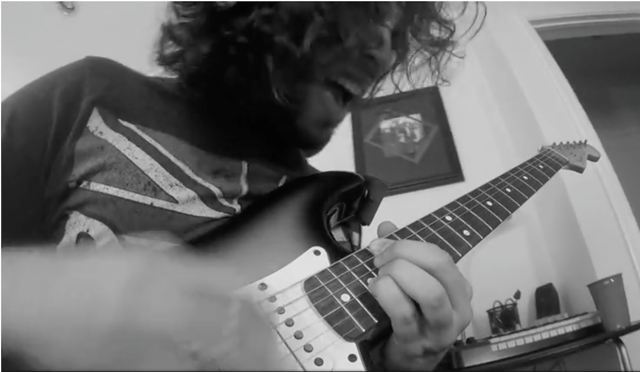I’ve had this one churning over in my mind for a while now and I’ve finally managed to gather my thoughts into a coherent (and somewhat lengthy) article. There are a lot of articles on how to make money as a guitarist (and a lot of get-rich-quick schemes to avoid), but I prefer to see it as making a living because at the end of the day, money is a small part of the big picture. Don’t worry, this isn’t the usual run-down of things you could make money from if you play the guitar as some kind of sideline. What I want to get into here is how to go about it, and perhaps more importantly, how to muster the mental strength to really do this. So, here are ten things to work on if you’re thinking about making a sustainable living from playing the guitar.
1. Decide how much you want to make
So, most people decide what to eat, what to drink, how to dress, where to live, what to think, who to be friends with, who to believe etc., but what most people don’t decide is how much money they want to make. This is bizarre when you think about it because YOU decide in almost every other aspect of your life except this one. So, why can’t YOU decide how much you make? I’m sure you can give me a list of reasons but they’re all excuses at the end of the day. Deciding to play guitar for a living is a scary enough thing to do in the first place; couple this with your well-meaning parents and relatives bestowing the curse of poverty on you from the day you decide to do this and you’re already at a disadvantage. This is why I insist you decide how much you want to make playing the guitar for a living. Obviously, this needs to be enough to have a comfortable life, not some meager amount just to get by while living the struggling artists’ dream – it’s not as romantic as it sounds. Go big, go for more than enough. I guarantee you there are plenty of guitarists making more than enough to get by, you (and your parents) just don’t hear about them because they’re too busy working and living the dream to be whining on internet forums. Choose your figure and cling to it in your mind; you may feel a little uneasy at first (this is natural), but once you start believing it (and stop sabotaging yourself), everything will start to fall into place.
2. Get rid of your poverty mindset
Check that you don’t have a poverty mindset. You don’t have to be poor to have a poverty mindset. Poverty mentality is a mindset about money that develops over time – it is a “poor me” attitude that stems from a deep-seated belief that there is never enough. It permeates all the areas of your life and keeps you on the treadmill of work-pay bills-work-pay more bills. It basically means that whatever you do for a living, you’ll always be in paycheck-to-paycheck survival mode or up to your ears in debt. If you’re not sure whether you have a poverty mindset, there are a few giveaway signs:
-You don’t save money
-You’re always jealous of what other people have
-You think the world owes you something
-You feel that being happy is some elusive destination you’ll reach when [insert thing that will never happen happens]
-You’re not grateful, and you criticize others all the time
-You have a constant fixation on money, or the lack of it
-You secretly hate rich people
-You make decisions based on fear
-You live from paycheck to paycheck-You’re currently in denial of any of the above 😉
“Change your thoughts and you change your world.”
–Norman Vincent Peale
It really is that simple, so if you’ve identified the poverty mindset, or some degree of it, I’d urge you to work on turning things around as this kind of mindset will inevitably and ultimately hold you back.
Essential Reading: How Rich People Think by Steve Siebold
3. What to invest in (not gear)
I played shitty gear for so long, I made it sound good, but if I had $1,000 to invest in my music career, I still wouldn’t buy expensive gear. Yes, you need decent gear if you want to be a pro but I imagine you already have some very usable gear. So, when your next $1,000 comes along, invest it in publicity for your music project. $1,000 bucks invested in promoting your project on social media or on Google goes a hell of a long way. If you’re a guitar teacher, you could reach almost all the guitarists in your city. If you want to sell your music and get noticed, with a $1,000 you could make a significant dent in the world market. In short, if you want to get out there a $1,000 in publicity will get you far more noticed than a $1,000 guitar around your neck.
4. Get real feedback from regular people
Feedback from your family, friends and other musicians is all well and good, but probably more than a little biased. The feedback you really need is from people who will buy your product or hire your service for no other reason than the fact that they genuinely like it. In other words, you provide enough value to them that they’re willing to part with their hard-earned cash for whatever you’re selling. These are the people that’ll tell you whether your product is intrinsically good or not based on how it makes them feel and/or whether they feel they need it. Remember, many of them are judging your project from the non-musician perspective (try to remember listening to music when you weren’t a musician), and they’re going to be key in getting the word out.
5. Get schooled
Skills on guitar, or any instrument, don’t just magically appear overnight; you have to work for them, and a great place to start to do this is music college. I went to the ACM in the early 2000s and it opened my eyes to what I needed to learn, how the industry works, how to network, how to be disciplined, how to practice, and much more besides.
If you don’t have the time or money to go to music college, there are a few great courses I’d recommend taking instead. You’ll find them on Udemy, and they cover pretty much everything you’d learn at music college for a tiny fraction of the price.
Complete Guitar System – Beginner to Advanced by Erick Andreas
The Professional Guitar Masterclass by Michael Palmisano
6. Pay your dues
Music college is just the start; you’ve still got to pay your dues in the woodshed. Don’t make the mistake of watching some amazing player on YouTube and thinking that they didn’t work their ass off for the best part of a decade or longer to get where they are. You can be sure they put the practice and playing hours in, and you need to do the same. Don’t feel intimidated either, they were all where you are right now, so you know it can just be a matter of time if you stick with it. What you’re seeing is the product of all those hours in the woodshed, not someone who picked up a guitar and became a virtuoso overnight.
7. Have an online presence
Today, you need to have some kind of online presence. Most people go with social media but I’d like to suggest a slightly different spin on it. Prologue One-Page Websites on are exactly as the name suggests: a one-page website that’s quick to set up and features a picture of you, a brief bio, and all the links to your social media sites. Check them out, not only do they look professional, they’re ridiculously low maintenance, and think how much easier it is to give someone a “yourname.com” as a means of contact rather than the complicated and obscure Twitter and Instagram handles you chose when you were 17. What’s more Prologue One-Page Websites cost $4.99 a year – next to nothing. Check them out on name.com.
8. Don’t put all your eggs on one basket
Without wishing to sound like your parents, there are a lot of things guitarists choose not to do that end up being bad career decisions, such as not learning to read music, even chord charts, not working on their ear, not working on their rhythm playing, refusing to play certain genres, and above all, not being a solid all-round player. Avoiding these things is like sabotaging your career five years down the road. You may think there are a lot of guitar players going for the top gigs, and there are, but where guitarists are concerned, prospective hirers are always faced with quantity over quality i.e. out of 100 guitarists there will be 6 that can read and play rhythm; the rest may as well have stayed in bed that day. You don’t want to be making decisions that gradually rule you out of that handful of guitarists that can cope with anything that’s thrown at them.
9. Stand by your rates
This ties in with point 2 somewhat. Musicians in general seem to feel the need to reduce their rates to the floor, or work for free, just to get the job, then end up resenting themselves and the client, as well as feeling dirty and cheap. Make sure your rates are fair, or at least creatively-bundled so that everyone wins when you provide your services. Don’t ever work for free or for less that your established rates, even if you think you’ll get some good exposure. These gigs aren’t a good match for you or your client as they are based on negative energy, and will most likely turn sour sooner or later. Remember that prices are relative – if someone thinks you are too expensive, they simply don’t resonate with what you’re offering, and it won’t be a pleasant experience. It works both ways; if someone thinks you are too cheap, they’ll associate your service with poor quality. If your prices are fair and provide value to people, the client that is a match for them will show up in droves, and this is the client you want.
10. A burning desire (and a little gratitude) will see you through
It’s amazing how far you can get with something just by not giving up. If all else fails, or you don’t know what to do, just keep on keeping on and be grateful for what you have and what you’ve already achieved. This website is a prime example – nowadays it enjoys an ever-growing readership but for the first two years it was hard-going, and there were times when I wondered if it was worth carrying on, but thanks to the reader support, it has become a success and I’m incredibly grateful.
So, if you want to make a living as a guitarist, know that it’s entirely possible, and that I wish you every success.



